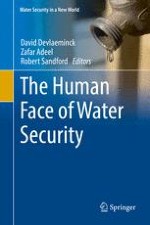2017 | OriginalPaper | Buchkapitel
2. Water Security as the Centerpiece of the Sustainable Development Agenda
verfasst von : Zafar Adeel
Erschienen in: The Human Face of Water Security
Aktivieren Sie unsere intelligente Suche, um passende Fachinhalte oder Patente zu finden.
Wählen Sie Textabschnitte aus um mit Künstlicher Intelligenz passenden Patente zu finden. powered by
Markieren Sie Textabschnitte, um KI-gestützt weitere passende Inhalte zu finden. powered by
